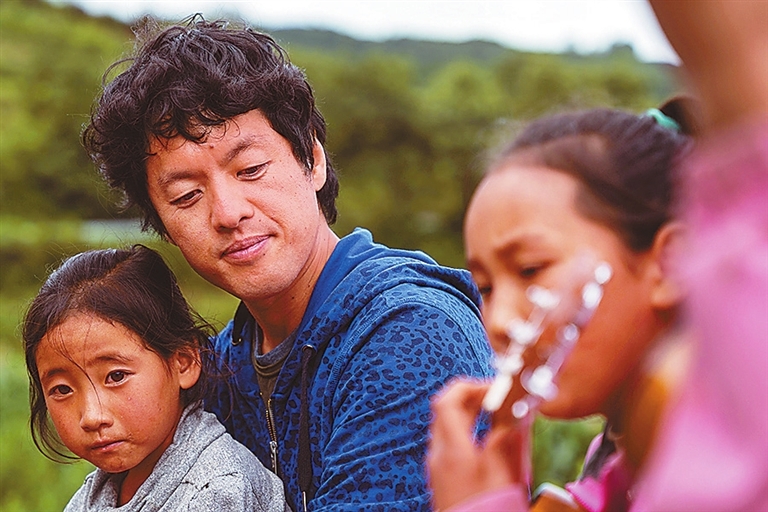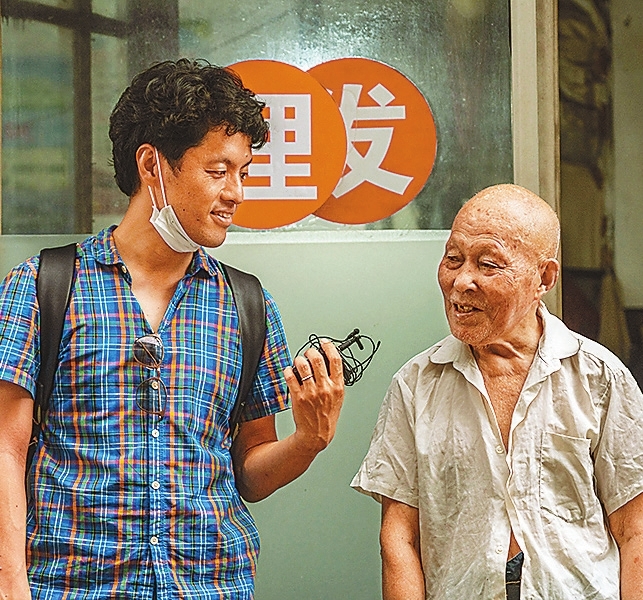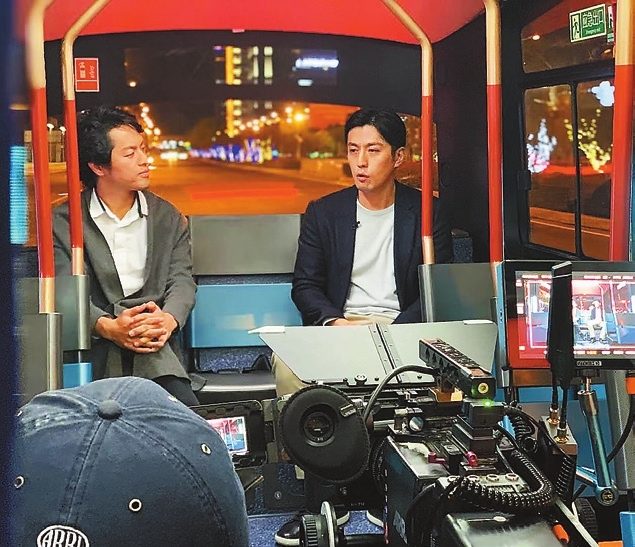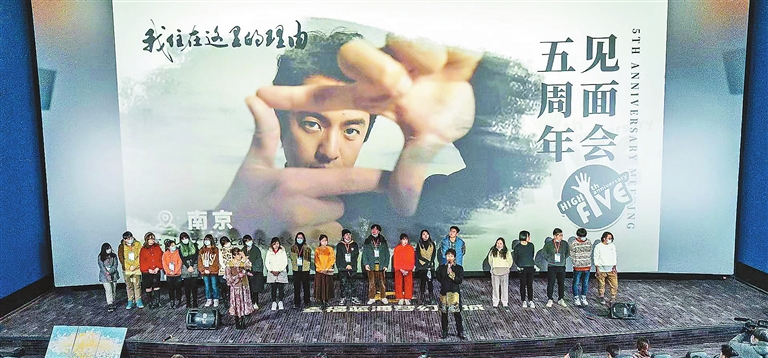



Editor’s Note: A growing number of foreigners who are living or have lived in China are now presenting the country’s real life to the outside world through their videos and tweets. Today, we present you the sixth of a series of stories about the social media influencers who are endeavoring to right the wrong of the Western perception of China. Xia Yuanjie szrbgracexia@126.com RELEASED June 26, 2020, a one-hour documentary, “Long Time No See, Wuhan,” garnered 14 million views and 150,000 reposts within two days on Chinese and overseas video platforms. The director of this work surprisingly is a Japanese independent documentary director, Ryo Takeuchi. He went to Wuhan in June 2020, one month after the city reopened to the public after a 76-day lockdown and recorded the daily life of Wuhan residents, in order to present the real image of this Central China city. The documentary dispels prejudices concerning Wuhan, which was the epicenter of the COVID-19 outbreak in China. Foreign Ministry spokesperson Zhao Lijian gave a thumbs up to Takeuchi’s work, saying that the film is touching and “shows the resilience and optimism of Wuhan residents.” “Curiosity is my drive to make documentaries. Authenticity is my basic principle. It is the real China I present through my lens,” Takeuchi told Shenzhen Daily. Unscripted documentary A bond between the director and China began in 2001, when he was 23 and came to China to film a documentary about mahjong. About nine years later, he again came to China. With an NHK team, he spent one year filming the Yangtze River. These experiences strengthened his determination to record the country full of changes and opportunities. Takeuchi and his wife moved to Nanjing, Jiangsu Province, in 2013, setting up a documentary studio titled He Zhi Meng, and registering his accounts under the same name on various social platforms. The original intention was to foster more communication between China and Japan, as he realized that Chinese people had little knowledge about contemporary Japan. To truthfully record the reality, Takeuchi doesn’t write scripts for filming. He prefers to feature characters that are mostly ordinary people and record their daily life in a realistic style. “I like to film the details (of the characters). I want to show their thoughts and personalities via those details. For example, when an interviewee suddenly shakes their hands or legs, I will use a close-up shot to capture it. That’s what unscripted documentary means,” he told Shenzhen Daily. His first unscripted documentary series, “The Reason I Live Here” (“I Live”), depicts Chinese people living in Japan and foreigners residing in China. It aims to enhance different countries’ understanding of each other. The first three seasons have won a score of 9.8 out of 10 on the review website Douban. Chinese citizens affectionately gave Takeuchi a Chinese nickname, “Uncle Liang.” China’s anti-pandemic achievements Amid the COVID-19 pandemic, Takeuchi found more and more inconsistency between foreign news and what he experienced in China. “I had read many smearing coverages released by Western and Japanese media about China’s epidemic. I decided to show the real China to the world as an expat.” So he shot three works under China’s anti-pandemic combat topic. The first is a 10-minute short video “Nanjiang First Scene: A City Sees No More New Confirmed COVID-19 Cases” recording Nanjing’s efficient pandemic preventive and control measures. The second work is “Long Time No See, Wuhan” featuring the daily life of 10 people in 10 days in Wuhan, Hubei Province. The last one is a documentary titled “The Post-Pandemic Era”shedding light on China’s achievements in epidemic control and economic recovery. He told Shenzhen Daily that his intention was to raise Japanese people’s awareness of the importance of pandemic prevention and control and to share China’s successful anti-pandemic measures with Japan and other countries. Takeuchi’s “China Anti-pandemic Trilogy” has earned him rave views on video platforms worldwide and has made him widely known in China, Japan and other countries. He also won praise from Foreign Ministry spokespersons Zhao Lijian and Hua Chunying. Hua made a remark in a daily news briefing Jan. 6, saying that “We appreciate the fact that Takeuchi recorded truthfully without bias this extraordinary journey that China has gone through.” Poverty alleviation in Daliang Mountains “Beyond the Mountain” is another documentary by the independent director. He focused on China’s poverty alleviation policy in this work. He visited Liangshan Yi Autonomous Prefecture in Southwest China’s Sichuan Province 10 years ago for NHK’s Yangtze River documentary. “I could only ride a donkey into the Daliang Mountains, which was really poor at that time,” said Takeuchi. “Is it possible that these places can get rid of poverty over a decade? I want to see for myself.” After filming, he has hailed China’s poverty relief efforts and the significant achievements. He was amazed by the changes of infrastructure and living conditions in the Daliang Mountains, such as free resettlement houses provided by the government and the convenient transportation. On the other hand, he said bluntly, “Education is really important for people in poverty-striken areas. It is tough to free the minds of people who are constrained by poor transportation and information access. A change of mindset is required.” A fine line “There doesn’t exist an absolutely objective documentary. It is impossible to be 100 percent neutral,” said Takeuchi. “My subjective intention is to show the facts, the likes of which I see. We are doing our best to be objective.” He said that Western and Japanese media are inclined to exaggerate the negative side of things that happen in China and deprecate China on purpose. “For example, there is the food safety problem in a Chinese restaurant, which is very normal in a country with a population of 1.4 billion. However, foreign media would state that the whole country has the food safety problem, which is lying and smearing.” Some foreign media and netizens questioned his motives behind presenting the positive side of China. “Some Japanese media maligned that I am a spy from China, noting that I was paid by the Chinese Government. Those ridiculous comments made me very angry!” He explained that He Zhi Meng doesn’t set any frame before filming: “Neither the positive energy, nor the negative angle are things we would take into consideration. We decide the theme based on the footage we shoot.” With the earnings from shooting business films, the studio is able to film independent social-issue-themed documentaries. “‘Long Time No See, Wuhan’ is completed by my team from planning to shooting, editing and projecting. The company actually bore losses for this documentary.” “I would never ever have a double standard,” said Takeuchi. “We posted the same content on overseas and Chinese media platforms at the same time. If the documentary is pro-China, the overseas audiences will say it is forged. If it is anti-China, Chinese people will have no interest. It is tough to find a fine line.” When asked whether he would give up shooting, Takeuchi said he would keep working. “Although my documentaries have triggered a lot of cyber-bullying, more people watch and recognize my works.” | 
